- Effect of Neem oil and Haridra on non-healing wounds - (https://www.ncbi.nlm.nih.gov/pmc/articles/pmc4492024/)
- Discovering the link between nutrition and skin aging - (https://www.ncbi.nlm.nih.gov/pmc/articles/pmc3583891/)
- Antifungal activity of different neem leaf extracts and the nimonol against some important human pathogens - (https://www.ncbi.nlm.nih.gov/pmc/articles/pmc3768785/)
- Neem (Azadirachta indica): Prehistory to contemporary medicinal uses to humankind - (https://www.ncbi.nlm.nih.gov/pmc/articles/pmc3695574/)
Introduction to Neem and Neem Oil
Neem is a sacred gift of nature. It belongs to the "Meliaceae" family and has been extensively used by humans since pre-historic times. An acknowledged source of Ayurvedic medicine for over 4,500 years, botanically, it is known as "Azadirachta indica" which means "the free tree of India". All parts of the neem tree can be used for the treatment and management of various diseases.
Neem is an established medicinal plant in 30 different countries around the world including Africa, Asia, Central and South America. Neem trees grow up to a height of 12 feet and they have a productive lifespan of 150 to 200 years.
Neem oil has been used for the treatment of various chronic skin conditions such as eczema, acne, ringworm, psoriasis and warts. Furthermore, neem oil is also a vital component of various cosmetics that are used to rejuvenate and beautify the skin.
Neem oil is extracted from the fruits and seeds of neem. It has a bitter taste and is yellowish-brown in color. The active compound present in neem oil is "Azadirachtin". The content of this compound varies and depends on the extraction process and the quality of the neem seeds used to make the oil.
Neem oil is extracted through solvent extraction or pressing methods. The fatty acids present in neem oil include:
- Palmitic acid
- Stearic acid
- Oleic acid
- Linoleic acid
- Arachidic acid
Benefits of Neem Oil for Healthy Skin
Neem oil has unique cleansing properties that can keep your skin healthy, and aid in curing and managing several skin-conditions..Let us have a look at how this miraculous oil enhances overall skin health:
Treats Scabies
Scabies is a skin condition caused by mites burrowing into the skin. This causes itching and rashes.
Scientific studies have revealed that treatment with neem leaves and oil is a safe and effective way to treat scabies. Active ingredients present in neem oil reduce redness and inflammation of skin caused during this condition. It further keeps itching under control and has a soothing effect on the skin.
Healthy compounds present in neem oil further prevent the growth and multiplication of mites and thus, prevent their spread.
Apply neem cream or lotion containing neem oil on the affected area. If the affected area is large, add 4-5 drops of neem oil to your bath tub.
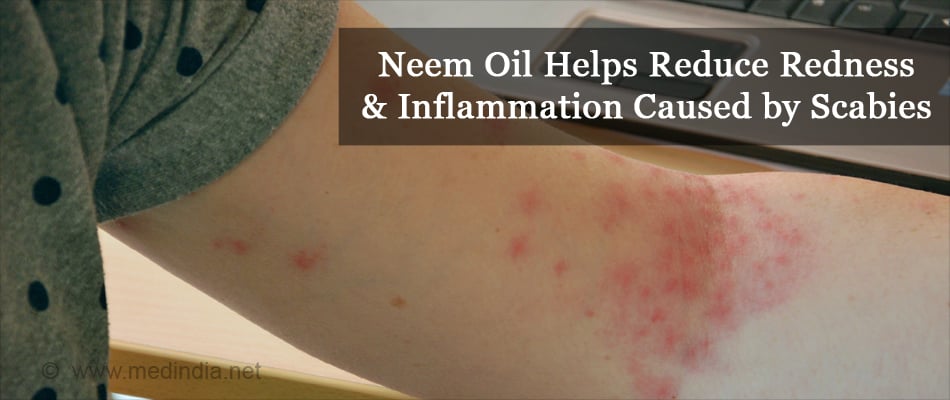
Improves Skin Texture
Studies have found that applying neem oil on the skin regularly can prevent dry skin. Neem oil is rich in vitamin E, calcium and essential fatty acids.
These essential fatty acids and vitamin E penetrate deep into the skin and further promote healing of minute cracks which are a result of severe skin dryness.
Furthermore, they are easily absorbed without making the skin oily or greasy. Thus, neem oil can make your skin soft and supple.
Anti-Aging Property
Bioactive components such as "limonoids" present in neem oil prevent premature aging. It stimulates the production of collagen, a protein present in the skin responsible for skin elasticity and strength.
Neem oil also reduces signs of aging such as dark spots, fine lines and wrinkles. Oxidative stress and free radical load can lead to premature aging. Vitamin E present in neem oil is a powerful antioxidant that neutralizes free radicals and fights oxidative stress.
Thus, neem oil has natural anti-aging properties.
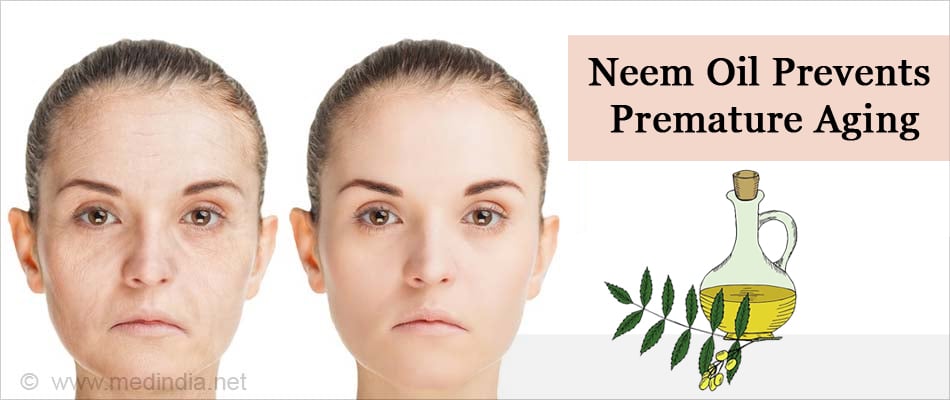
Anti-Acne Potential
Neem oil is very effective in fighting acne. This property of neem oil is attributed to its anti-bacterial action.
Compounds present in neem oil may reduce redness and inflammation associated with acne. They further protect against acne-causing bacteria, and thus prevent break-out.
Furthermore, essential fatty acids present in neem oil help in the removal of acne scars and blemishes.
Combats Psoriasis
Psoriasis is a skin condition in which dry, red and raised patches develop on the scalp, outside of the elbows and knees. Irritation, scaling, lesions and itchiness are common features of this condition.
There is no cure for psoriasis, but neem oil can treat its symptoms. Some studies have found that topical application of organic neem oil on the affected areas can help in clearing up psoriasis. Vitamin E and essential fatty acids present in neem oil help in softening the skin which is otherwise dry during psoriasis. As the skin becomes soft, irritation and itchiness disappear. It further restores moisture and helps in healing scaling and lesions.
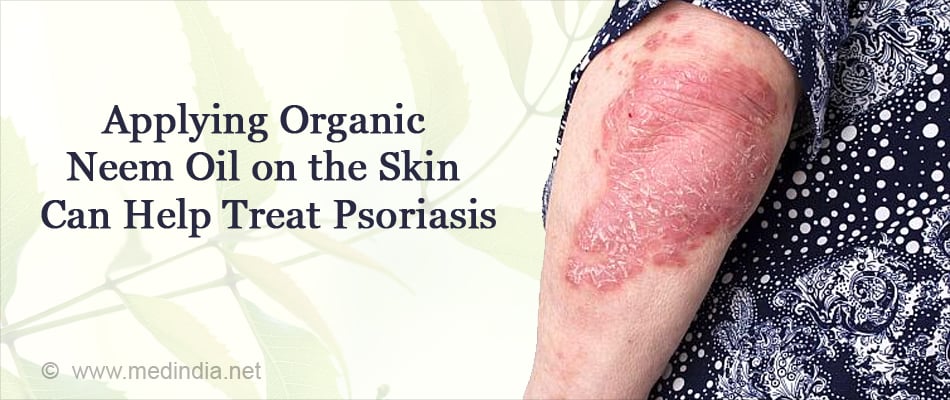
Treats Eczema
Eczema or atopic dermatitis is an inflammatory condition of the skin which has no cure. In this condition the skin becomes red, dry and patchy. Scratching can further worsen the condition.
Bioactive compounds present in neem oil possess anti-inflammatory property. They inhibit the production of inflammatory compounds and thus reduce overall inflammation. Hence, application of neem oil can relieve symptoms of eczema.
Furthermore, neem oil can prevent loss of moisture from the skin and helps to make it supple.
Fights Ringworm
Neem oil contains natural bioactive compounds that are very effective against fungi that cause skin infections such as ringworm. Ringworm is a fungal infection of the skin or scalp caused by the fungi "Trichophyton rubrum".
Nimbidol and gedunin, two compounds present in neem oil, are strong anti-fungal agents that destroy the fungi responsible for causing ringworm.
In addition to this, neem oil inhibits the growth and spread of fungi to other parts of the skin. Thus, it further prevents spread of the infection.
Neem oil also reduces redness of the skin which is a feature of ringworm.
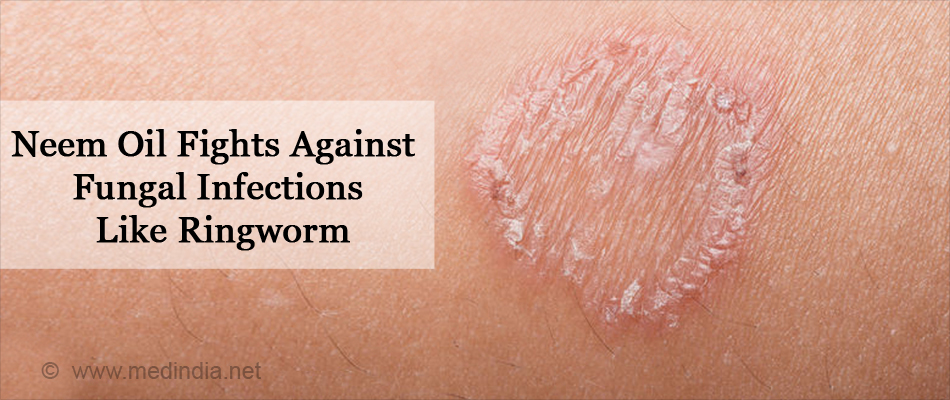
Treats Seborrhoeic Dermatitis
Seborrhoeic dermatitis is a skin condition that affects the scalp, torso and face. It is characterized by red, itchy, scaly and flaky skin. Dandruff is also a common feature. Such a condition is caused by the fungi "Malassezia Globosa".
Neem oil possesses a strong anti-fungal activity against such fungi and helps in the treatment of seborrhoeic dermatitis.
Furthermore, neem oil lowers inflammation and helps in moisturizing the skin, which is otherwise scaly and flaky during this condition. This repairs and soothes damaged skin.
Helps In Wound Healing
Scientific studies have found that neem oil helps in chronic wound healing. It enhances the regeneration of tissues and promotes rapid multiplication of new blood vessels of the skin.
Nimbidin, an active compound present in neem oil, contains sulfur that heals lesions and wounds.
Furthermore, essential fatty acids present in neem oil promote wound healing, clear blemishes and enhance overall skin health.
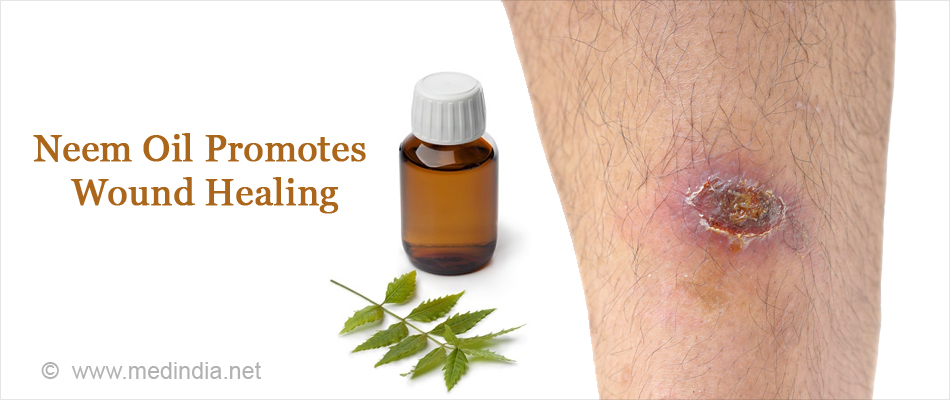
Different Ways to Apply Neem Oil
If you have a sensitive skin, direct application of neem oil can irritate your skin. You can first apply neem oil on your hand. If it irritates your skin, you can try these different ways of applying neem oil:
- Add a few drops of neem oil to coconut oil. Mix it properly and then apply it on the affected area with the help of a cotton ball.
- Add some drops of neem oil to your bath tub.
- You can even dilute neem oil by adding a few drops to your shampoo or lotion.
- Neem oil can also be added to home-made face-packs or face-masks.










